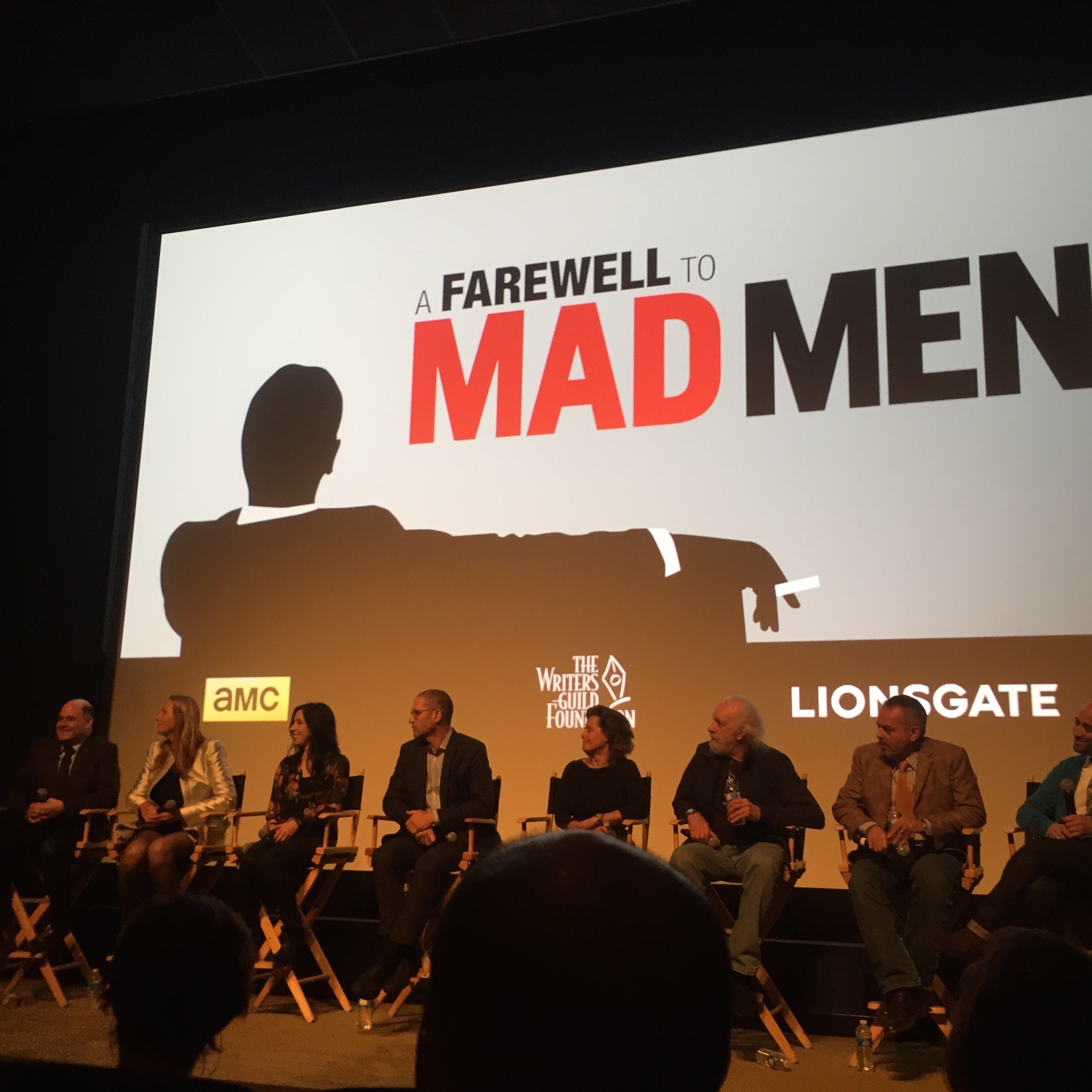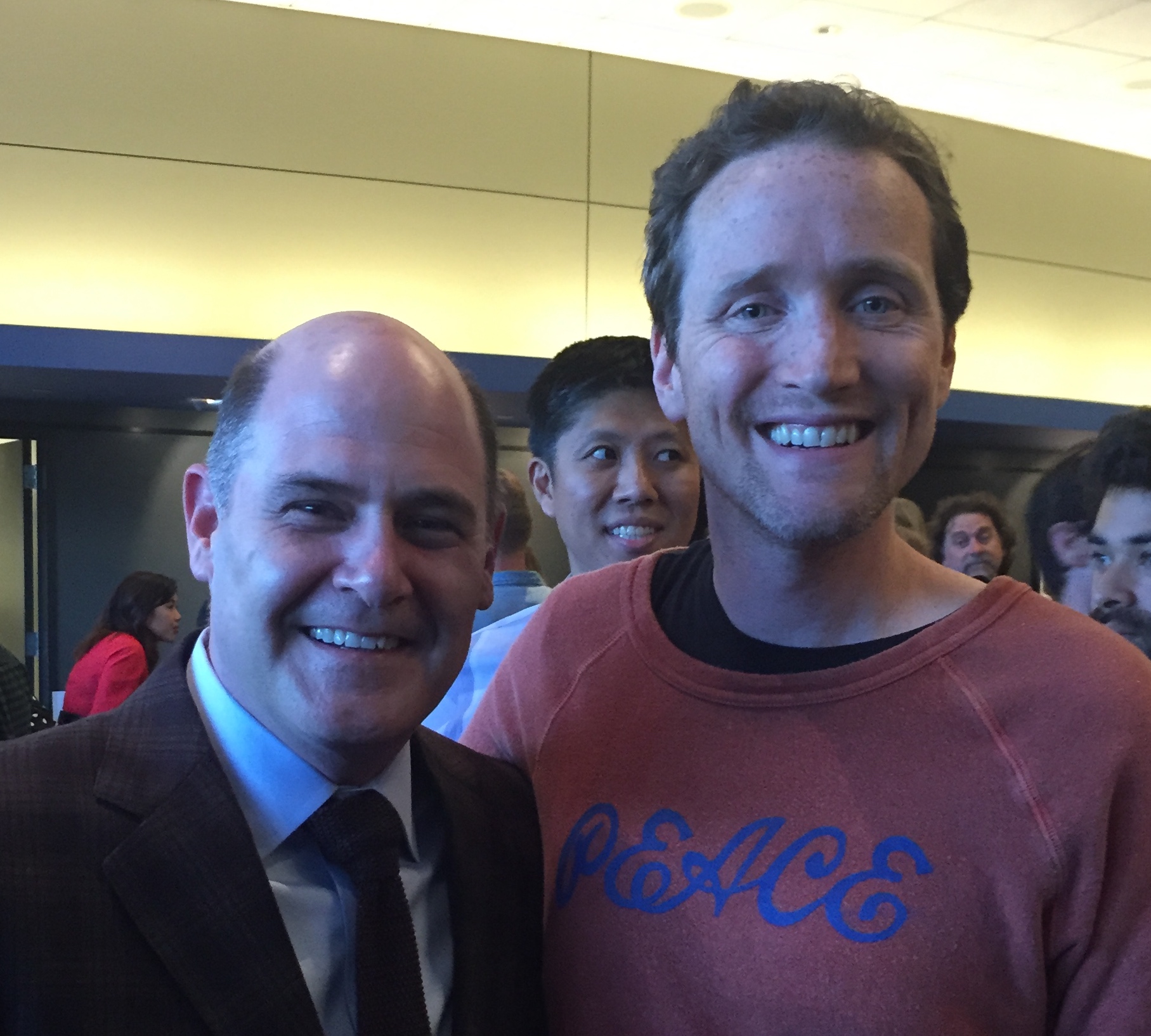What can we learn from Mad Men?
Last week I went to a sort of end of term writers round up of Mad Men.
It was hosted by Matt Groening (yes, the guy who invented The Simpsons) and featured all the Mad Men writers (yes, including the creator, director and exec producer, Matt Weiner, and the incredibly legendary complete and utter motherfucking legend, Robert Towne, of whom more later).
So what did I learn?
1. Matthew Weiner is very nice, witty, urbane, slightly camp and full of great stories.
2. The ideas credit bleeds. Basically, there’s a big room of talented people who contribute all sorts of stuff. The person who writes the first draft gets their name on the episode, then Matt rewrites it, sometimes with the original writer in the room; sometimes alone. For those of you who wrestle with credit (I know I did in my youth, and in another way when I became a CD), this clip sums it all up for the Mad Men guys:
As Matt said, ‘I’ve been Don and Peggy in that scene’. So have I, but less shouty. Of course, these days there are credits on ads, but it’s a team game and we’ve all seen people with no involvement (in fact people who tried very hard to make things worse) get credit for an ad’s brilliance, while the unsung hero who just dropped the magic endline into a chat in a pub gets nothing. It sucks, but with time and experience you can both learn how to make it work and care less when it doesn’t.
Interestingly, the tiny chat I had with Robert Towne involved me asking if he really was one of the writers on Bonnie and Clyde. He told me he was. Is his name on the credits? No. Did he get paid? Yes. Did he get pissed off and cry in the corner? No, he wrote Chinatown. Write Chinatown.
3. When Matt used to write for the Sopranos they’d quite arbitrarily add in more Christopher or use a bit less of Paulie Walnuts. There was no big plan. If they got bored with writing so much of one character they’d pick another and give them a juicy storyline. I thought there was a big, well thought out plan, but no.
I actually got to ask the panel a question that relates to this: if you don’t know how many seasons you’re going to get, how do you construct an overall arc or story for the characters? Matt explained that they put everything into every episode then harvested those things later on. There might have been an old friend or distant relative mentioned in episode 5 who could then appear in episode 25. If you look in season one there’s a point where the head of McCann’s tries to get Don in to work on Coke. At that time the ending hadn’t been planned, but it sort of had. Look at the characters who appear and disappear. A strong and complete backstory gives you all you need to fill up the later episodes of an ongoing series.
4. Here’s the real creative advice: fundamentally you need to trust your intuition. When I watch Mad Men I often wonder ‘Why that sentence?’ ‘Why that twist?’. In the above point it’s clear that the plan (in the case of Mad Men and The Sopranos, two of the four greatest TV series ever made) is not rigid, but overall Matt believes in running with plotlines and conversations that feel right. They might well defy real logic, but there’s an emotional logic that can guide you through decisions that will always be subjective, with no definite right or wrong.
5. Robert Towne. He arrived in a chauffeur driven Bentley, then behaved like he was an old uncle who had been misinvited to the school prom, but not in a bad way. He was a bit grumpy, especially compared to both Matts, but he’s Robert fucking Towne. The Mad Men thing was cool, but once you’ve written Chinatown everything else is always going to be a comedown. One person asked how he ended up writing on the show (here’s a lesson for any of you who ever wonder about taking that chance to make that connection): Robert and Matt were at some dinner. Robert had never heard of Mad Men, but Matt’s wife told him about it (much to Matt’s embarrassment) and suggested he watch an episode. He did so, loved it and offered his services. So don’t be afraid to ask.
A lady then got up and told Robert that Chinatown changed her life. Then she burst into tears and we all applauded.
Robert also quoted Mark Twain: ‘When in doubt, tell the truth”. He also said you could take that however you wanted…
This is the scene that Robert Towne considered the best in the show (plus some background from one of the writers):
https://www.youtube.com/watch?v=J1PTqPuqOuI
6. There was an advertising consultant on the panel called Josh Weltman. I hope you don’t mind, but I thanked him on behalf of all of us for absolutely nailing the advertising side of the show. He appreciated that and we chatted about our respective ad careers. He’d also been at BBDO, so we agreed that sooner or later almost all of us end up rolling into Omnicom…
He also told a story about how he and his CD (not at BBDO) had gone to sell some work. They did so, but in the cab back to the office Josh had a better idea. The CD agreed that the new idea was indeed an improvement, so they turned the cab round and went back to the client’s office where they unsold the first idea and sold the new one. I wonder if that ever happens now…
Anyway, it was a really incredible evening, on a par with the Breaking Bad one they did last year.


That’s so LA. Very envious.
That evening alone would have made the move to the States worth it. Jealous.
Blistering Writers Guild Foundation evening vs cup final?
I enjoyed the Cup Final slightly more, but only slightly.
Did the woman say how Vhinatown had changed her life before she burst into tears? I’m trying to imagine how. Did she have a broken nose perhaps?
Maybe her mother was her sister!